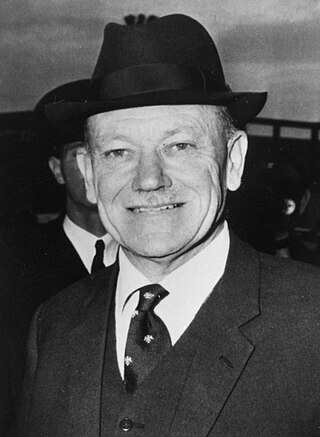Related Research Articles

Rhodesia's Unilateral Declaration of Independence (UDI) was a statement adopted by the Cabinet of Rhodesia on 11 November 1965, announcing that Rhodesia a British territory in southern Africa that had governed itself since 1923, now regarded itself as an independent sovereign state. The culmination of a protracted dispute between the British and Rhodesian governments regarding the terms under which the latter could become fully independent, it was the first unilateral break from the United Kingdom by one of its colonies since the United States Declaration of Independence in 1776. The UK, the Commonwealth, and the United Nations all deemed Rhodesia's UDI illegal, and economic sanctions, the first in the UN's history, were imposed on the breakaway colony. Amid near-complete international isolation, Rhodesia continued as an unrecognised state with the assistance of South Africa and Portugal.

Sir Humphrey Vicary Gibbs,, was the penultimate Governor of the colony of Southern Rhodesia, from 24 October 1964 described by its internationally unrecognised government simply as Rhodesia, who served until, and opposed, the Unilateral Declaration of Independence (UDI) in 1965.

Winston Joseph Field was a Rhodesian politician who served as the seventh Prime Minister of Southern Rhodesia. Field was a former Dominion Party MP who founded the Rhodesian Front political party with Ian Smith.
Hilary Gwyn Squires was a South African judge and barrister, who was brought in to preside over the Schabir Shaik fraud and corruption trial in Durban, South Africa, so as not to tie up legal proceedings elsewhere while the trial proceeded.
Sir Robert Clarkson Tredgold, KCMG, PC, was a Rhodesian barrister, judge and politician.
Major Sir Robert James Hudson,, was twice acting Governor of Southern Rhodesia.

Sir Thomas Hugh William Beadle, was a Rhodesian lawyer, politician and judge who served as Chief Justice of Southern Rhodesia from March 1961 to November 1965, and as Chief Justice of Rhodesia from November 1965 until April 1977. He came to international prominence against the backdrop of Rhodesia's Unilateral Declaration of Independence (UDI) from Britain in November 1965, upon which he initially stood by the British Governor Sir Humphrey Gibbs as an adviser; he then provoked acrimony in British government circles by declaring Ian Smith's post-UDI administration legal in 1968.
Sir John Charles Rowell Fieldsend, QC was a judge who served as the first Chief Justice of Zimbabwe. He also served as a judge in several British overseas territories.
Bennie GoldinQC was a Byelorussian-born, Zimbabwean lawyer and judge. He was a justice of the Supreme Court of Zimbabwe from 1980 to 1981. Previously, he served on the High Court of Rhodesia from 1964 to 1980. Born in Nesvizh, Byelorussia, he grew up in Cape Town, immigrated to Salisbury after World War II, and later returned in 1981 to Cape Town where he served as a judge in Transkei.
Sir Vincent Ernest Quénet was a South African-born Southern Rhodesian judge.
Sir Henry John Clayden was a Transvaal Colony-born judge who served as Chief Justice of the Federation of Rhodesia and Nyasaland from 1960 to 1964. He chaired the Rhodesian Commission of Inquiry into the 1961 Ndola United Nations DC-6 crash, which killed Dag Hammarskjöld, the Secretary-General of the United Nations.
Harry Elinder Davies, QC was a Rhodesian and Zimbabwean lawyer and judge.
John Richard Dendy Young, QC, SC was a Cape Colony-born lawyer, politician, and judge. Born in Cape Colony, Young joined the Public Service of Southern Rhodesia, before practising at the South Rhodesian Bar. He was a member of the legislatures of Southern Rhodesia and of the Federation of Rhodesia and Nyasaland from 1948 until 1956, when he was appointed to the High Court of Southern Rhodesia.
Eric William George Jarvis, CMG was a Rhodesian lawyer and judge.
Charles Edward Lukin 'Ted' Beck was a South African judge who served on the courts of Rhodesia and Zimbabwe.
Vernon Arthur Lewis, CMG, MC was a South Rhodesian politician and judge.
John Bernard Pittman was a South African-born judge Rhodesian and Zimbabwean lawyer, politician, and judge.
Sir Ralph John Morton, CMG, OBE, MC was a Southern Rhodesian lawyer and judge.
John Vernon Radcliffe Lewis was a Southern Rhodesian and Zimbabwean lawyer and judge.
The High Court of Southern Rhodesia was a Southern Rhodesian court of record. It was established in 1899 and ceased to exist in 1980 on the establishment of Zimbabwe. Throughout its history, it functioned both as a trial court and an appellate court.
References
- 1 2 "Odds: Death of judge Knight". The Rhodesian Law Journal. 9 (2): 200–202.
- ↑ Redgment, John (1985). "Plus ça Change..: Fifty Years of Judges in Southern Rhodesia, Rhodesia and Zimbabwe". South African Law Journal. 102 (3): 532–533.